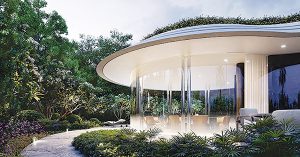Les Maisons is a low-rise development of just 14 units coming up on Nassim Road, a leafy street nestled between the bustling shopping district of Orchard Road on one end and the expansive quiet of the Singapore Botanic Gardens on the other. As Business Insider described it, Nassim is the Lion City’s very own Beverly Hills. And right now, property prices along this mile-long stretch of hyper-exclusivity are scorching hot.
In May, a 6,092 square-foot apartment in Maisons Nassim was sold by its Hong Kong-based developer Shun Tak Holdings, which is run by the late Macau gambling tycoon Stanley Ho’s daughters Pansy, Daisy and Maisy. It went for S$37 million ($27 million), the fourth-highest per square foot price on record for a new Singapore condo, according to OrangeTee & Tie, a property brokerage.
The buyer’s identity isn’t known. It could be a Singaporean tycoon who wrote the check, but the Les Maisons unit might well have been one of the 84 snapped up in May by foreigners, marking a big-bang return of global interest in Singapore property after the first quarter’s lull. Nor would it be a
surprise if the money
came from an expatriate banker: Permanent residents bought 142 units in May, compared with 79 the previous month.
Mind you, such things weren’t supposed to happen this year. For both
foreigners and PRs, already-steep additional stamp duties were further raised in December. Foreigners have to shell out a 30% levy, while PRs now pay 25% on their second homes and an unchanged 5% on first purchases. Only Singapore citizens buying their first homes are exempt from additional duties, which sit on top of the standard graded rate that rises to a maximum of 4% above S$1 million of market value. Despite such high taxation, there’s suddenly no dearth of homebuyers in Singapore, either local or foreign. The inescapable conclusion is this: The city-state’s latest property curbs have already lost their sting.
Will the Singapore authorities need to introduce more draconian restrictions? Maybe not this year, provided the US Federal Reserve remains hawkish enough to deliver a second 75-basis-point increase in interest rates in July.
Since the 2009 start of the global cheap-money era, Singapore has made 11 attempts to rein in speculation in its residential property market. The goal has been to prevent prices from rising too fast too soon; the tools have ranged from higher stamp duties to lower mortgage loan-to-value limits and stricter debt servicing ratios for homebuyers.
But the effect of these so-called cooling measures doesn’t last. “Sentiment typically recovers around two to six months after each round,†says Christine Sun, senior vice president of research and analytics at OrangeTee & Tie. This time, it’s back to business-as-usual in five months.
—Bloomberg
 The Gulf Time Newspaper One of the finest business newspapers in the UAE brought to you by our professional writers and editors.
The Gulf Time Newspaper One of the finest business newspapers in the UAE brought to you by our professional writers and editors.
